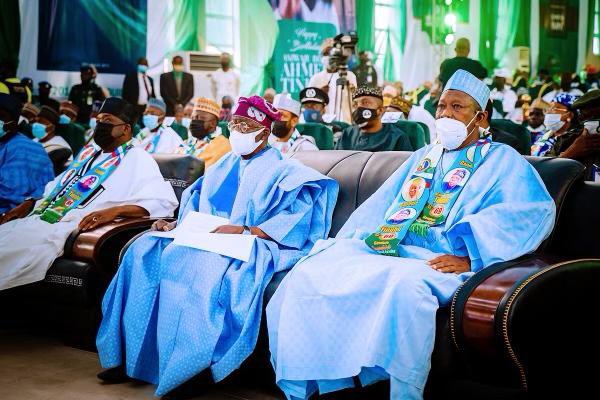Politics
Tinubu Colloquium: Democracy Not Only About Election – Rodrik, Harvard Professor

A Ford Foundation Professor of International Political Economy at Harvard’s John F. Kennedy School of Government, Dani Rodrik, has provoked a fresh debate about democracy saying it is not only about elections but protecting the rights of the minority, including the rights of the ethinic and religious minorities.
He also identified the lack of social and national cohesion as a challenge for economic growth in Nigeria, but however said that it was not a problem in Nigeria or Africa but also in advanced democracies as Africa only suffers more because of its ethnic-religious and linguistic differences.
Rodrik said these in his keynote address delivered during the 12th Annual Bola Tinubu Colloquium, which held on Zoom with the theme: “Our Common Bond, Our Common Wealth: The Imperative of National Cohesion For Growth and Prosperity”, where he also spoke on the subject of social cohesion in divided societies.
A copy of his speech and transcription of the questions and answers session was sent to journalists on Wednesday.
He said, “It is important to emphasise that democracy is not only about elections. It is about protecting the rights of the minority including the rights of the ethinic and religious minorities.
“On the average, participatory democracies produce greater economic stability and (perhaps) higher economic growth. They are better at avoiding large mistakes and they respond to external shocks better, especially in divided societies.”
Using the example of how democratic countries had responded better to the COVID – 19 pandemic than authoritarian regimes, Rodrik argued that democracy remained the best way to ensure national cohesion.
While answering the question, “Is diversity a curse?” he said the countries that were much more diverse or fragmented in terms of ethinic and linguistic groups tended to perform worse in terms of economic development.
He said, “The general message is that counties that are more fractionalised in terms of ethnic groups or with much more ethnic heterogeneity tend to have high levels of poverty and deprivation and low levels of economic growth and productivity. Many African countries fall in this group.
“There is evidence that ethnic-religious-linguistic divisions leads directly to racism, discrimination, low trust, poor social outcomes, under-provision of collective, public goods, inequality, low growth ethno-national chauvinism, divisive politics, nativist (right-wing) populism and bad politics.”
President Muhammadu Buhari in his address, said despite reccuring tensions in the country characterised by ethnic and religious differences, Nigerians were better off and stronger together.
The President said Asiwaju Bola Tinubu remained a unifying factor, despite the nation’s diversity in religion, tribe and politics.
Buhari said, “This has been a constant factor in his outstanding political career, from the time he served in the short-lived Senate of the Third Republic to his involvement in the struggle for the actualisation of the June 12 mandate of late Chief MKO Abiola, to his much-acclaimed period of service as Governor of Lagos State from 1999 to 2007.
“The ranks of Asiwaju’s political collaborators, whether as party members, comrades in the struggle, members of his cabinet, or his advisers, assistants and political associates, have always reflected a pan-Nigeria attitude.
“I believe all of us here can also confirm that the same outlook of Asiwaju Bola Tinubu and other like-minded Nigerians eventually made possible the coalition of four political parties into what we now see as our great party, the All Progressives Congress (APC).”
President Buhari said that the theme of this year’s colloquium was apt and timely.
He said, “I can also relate personally to the ideals of one Nigeria. As a military officer, I have served with great comrades from all the nooks and crannies of our country. I have seen over and over again that their goodness or failings did not depend on ethnicity or religion.
“More importantly, I fought for the unity of Nigeria during the civil war of 1967 to 1970, and I saw first-hand the unspeakable horrors of war, not just on fellow soldiers on both sides, but on the civilians: innocent children, women and elderly citizens that they left behind. As we all know, the peace-building, recovery and reconstruction that followed could also not have succeeded under an atmosphere of inter-ethnic animosity.”
Vice President Yemi Osinbajo stated that the 12th Colloquium presented a golden opportunity to “increase the numbers of a new tribe of Nigerians,” which he described as “a tribe of men and women of all faiths, tribes, and ethnicities, committed to a country run on high values of integrity, hard work, justice and love of country.”
According to him, despite the various socio-economic challenges worsened by the fallouts of a global pandemic, Nigeria should avoid stoking tendencies, viewpoints and opinions that threaten the federation and our unity.
“The colloquium as usual bets on Nigeria and its creative and resilient people. Our theme this time – Our Common Bond, Our Common Wealth – focuses on peace building and national cohesion. We intend to interrogate from a National and regional perspective innovative strategies for sustaining peace, and prosperity in a heterogeneous society”, he said.
The Vice President also stated that the Colloquium, which is being hosted in Kano – outside Lagos or Abuja for the first time – was a pointer that Nigeria’s diversity is better harnessed as strength to further unite Nigerians.
Send Us A Press Statement Advertise With Us Contact Us
And For More Nigerian News Visit GWG.NG


